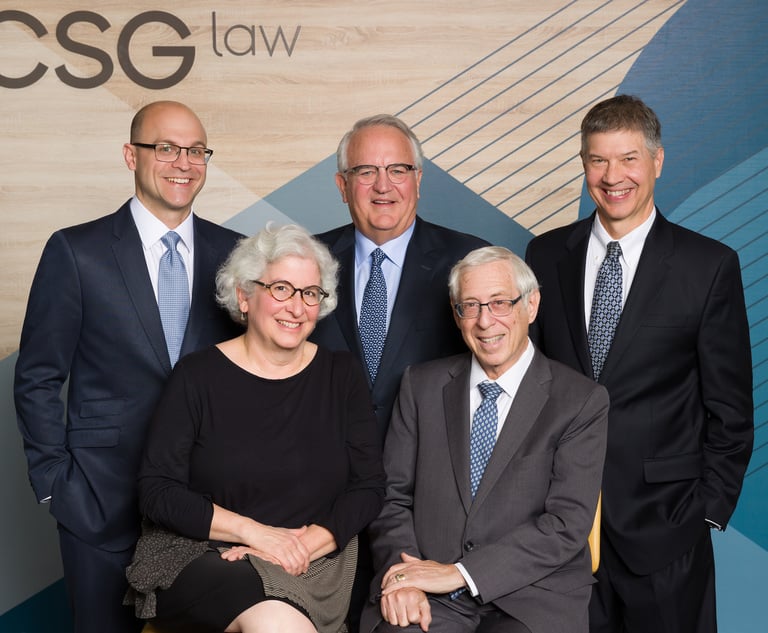DWI 'Bonuses' Paid to Ex-Municipal Judge Prompt Ethics Complaint
A former Little Falls, New Jersey, municipal court judge who paid himself $11,995 in "bonuses" from a state drunken-driving enforcement grant has received an ethics complaint by the Advisory Committee on Judicial Conduct.
November 07, 2017 at 02:30 PM
4 minute read

A former Little Falls, New Jersey, municipal court judge who paid himself $11,995 in “bonuses” from a state drunken-driving enforcement grant has received an ethics complaint by the Advisory Committee on Judicial Conduct.
The former judge, G. Dolph Corradino, allegedly paid himself out of the Municipal Court Alcohol Education, Rehabilitation and Enforcement Fund without obtaining the required approval from the local assignment judge, according to an ACJC complaint made public Monday. In addition, Corradino's expenditure of the funds was unrelated to its intended purpose, which was to hold additional court sessions to handle pending and backlogged drunken driving cases, the complaint states.
When Assignment Judge Ernest Caposela questioned him about the payments from the DWI fund, Corradino said he took the money “as his reward for the efficient performance of his court” and he believed the funds were available “to pay himself a bonus,” according to the complaint. But the ACJC says Corradino failed to comply with the proper procedure for disbursement of those funds.
Corradino was charged with violating two canons of the Code of Judicial Conduct—Canon 1.1, which requires judges to observe high standards of conduct, so the integrity and independence of the judiciary may be preserved, and Canon 2.2, which requires judges to promote the independence, integrity and impartiality of the judiciary. The complaint seeks restitution of $11,995 to the state judiciary and $2,744 to Little Falls.
Corradino, who was first appointed Little Falls Municipal Court judge in 1993, was suspended from his post in July 2015, and resigned in July of this year. He also was the presiding Passaic Vicinage Municipal Court judge and presiding judge of Passaic Vicinage Central Processing Unit, but he was not reappointed to those positions.
The DWI fund, created by the state judiciary in 2009, is intended solely to help municipal courts dispose of drunken driving cases, and can be used to compensate municipal court judges, prosecutors and other court employees for “work performed in addition to their regular employment hours,” Acting Administrative Director of the Courts Glenn Grant said in a memo issued upon the program's creation. The money is not intended to replace funds normally budgeted for court operation but “should be viewed as funding only for the court's additional DWI-related work,” Grant's memo stated. An accompanying set of guidelines issued by Grant said that “court staff can only be compensated if the session is conducted after the conclusion of regular court hours.”
From 2009 to 2011, the DWI grant was used to provide additional compensation to Corradino, the municipal prosecutor, court administrator and deputy court administrator, but from 2012 to 2015, only Corradino received compensation from the fund, the ACJC said in its complaint. An audit by the Passaic County Municipal Division manager, Sonya Noyes, revealed that no written requests were submitted to the assignment judge before Corradino made verbal requests for the funds from the Little Falls Township manager, the complaint said.
Payments to Corradino from the fund ranged from $647 in 2012 to $3,001 in 2009, for a total of $11,995 from 2009 to 2013 and 2015. In 2014 he received a bonus payment of $2,744 but it was charged to a regular municipal court salary account.
Corradino was admitted to the practice of law in 1966. His attorney in the case, Joseph LaSala of McElroy, Deutsch, Mulvaney & Carpenter in Morristown, said his client has retired from all judicial assignments but intends to fight the charges.
“Judge Corradino led an exemplary, stellar career at the bench and bar for decades,” LaSala said. “When this situation arose, he completely cooperated with the investigation. He's going to vigorously defend the material allegations in the complaint. He has the highest respect for the law and the rule of law and he has lived his career by that.”
This content has been archived. It is available through our partners, LexisNexis® and Bloomberg Law.
To view this content, please continue to their sites.
Not a Lexis Subscriber?
Subscribe Now
Not a Bloomberg Law Subscriber?
Subscribe Now
NOT FOR REPRINT
© 2024 ALM Global, LLC, All Rights Reserved. Request academic re-use from www.copyright.com. All other uses, submit a request to [email protected]. For more information visit Asset & Logo Licensing.
You Might Like
View All
Hit by Mail Truck: Man Agrees to $1.85M Settlement for Spinal Injuries

Appellate Div. Follows Fed Reasoning on Recusal for Legislator-Turned-Judge
4 minute read
Chiesa Shahinian Bolsters Corporate Practice With 5 From Newark Boutique
5 minute read
On the Move and After Hours: Brach Eichler; Cooper Levenson; Marshall Dennehey; Archer; Sills Cummis
7 minute readTrending Stories
Who Got The Work
Michael G. Bongiorno, Andrew Scott Dulberg and Elizabeth E. Driscoll from Wilmer Cutler Pickering Hale and Dorr have stepped in to represent Symbotic Inc., an A.I.-enabled technology platform that focuses on increasing supply chain efficiency, and other defendants in a pending shareholder derivative lawsuit. The case, filed Oct. 2 in Massachusetts District Court by the Brown Law Firm on behalf of Stephen Austen, accuses certain officers and directors of misleading investors in regard to Symbotic's potential for margin growth by failing to disclose that the company was not equipped to timely deploy its systems or manage expenses through project delays. The case, assigned to U.S. District Judge Nathaniel M. Gorton, is 1:24-cv-12522, Austen v. Cohen et al.
Who Got The Work
Edmund Polubinski and Marie Killmond of Davis Polk & Wardwell have entered appearances for data platform software development company MongoDB and other defendants in a pending shareholder derivative lawsuit. The action, filed Oct. 7 in New York Southern District Court by the Brown Law Firm, accuses the company's directors and/or officers of falsely expressing confidence in the company’s restructuring of its sales incentive plan and downplaying the severity of decreases in its upfront commitments. The case is 1:24-cv-07594, Roy v. Ittycheria et al.
Who Got The Work
Amy O. Bruchs and Kurt F. Ellison of Michael Best & Friedrich have entered appearances for Epic Systems Corp. in a pending employment discrimination lawsuit. The suit was filed Sept. 7 in Wisconsin Western District Court by Levine Eisberner LLC and Siri & Glimstad on behalf of a project manager who claims that he was wrongfully terminated after applying for a religious exemption to the defendant's COVID-19 vaccine mandate. The case, assigned to U.S. Magistrate Judge Anita Marie Boor, is 3:24-cv-00630, Secker, Nathan v. Epic Systems Corporation.
Who Got The Work
David X. Sullivan, Thomas J. Finn and Gregory A. Hall from McCarter & English have entered appearances for Sunrun Installation Services in a pending civil rights lawsuit. The complaint was filed Sept. 4 in Connecticut District Court by attorney Robert M. Berke on behalf of former employee George Edward Steins, who was arrested and charged with employing an unregistered home improvement salesperson. The complaint alleges that had Sunrun informed the Connecticut Department of Consumer Protection that the plaintiff's employment had ended in 2017 and that he no longer held Sunrun's home improvement contractor license, he would not have been hit with charges, which were dismissed in May 2024. The case, assigned to U.S. District Judge Jeffrey A. Meyer, is 3:24-cv-01423, Steins v. Sunrun, Inc. et al.
Who Got The Work
Greenberg Traurig shareholder Joshua L. Raskin has entered an appearance for boohoo.com UK Ltd. in a pending patent infringement lawsuit. The suit, filed Sept. 3 in Texas Eastern District Court by Rozier Hardt McDonough on behalf of Alto Dynamics, asserts five patents related to an online shopping platform. The case, assigned to U.S. District Judge Rodney Gilstrap, is 2:24-cv-00719, Alto Dynamics, LLC v. boohoo.com UK Limited.
Featured Firms
Law Offices of Gary Martin Hays & Associates, P.C.
(470) 294-1674
Law Offices of Mark E. Salomone
(857) 444-6468
Smith & Hassler
(713) 739-1250






